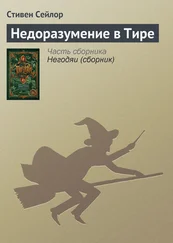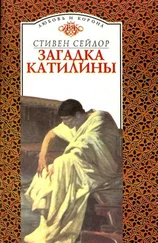Стивен Сейлор - The Throne of Caesar
Здесь есть возможность читать онлайн «Стивен Сейлор - The Throne of Caesar» весь текст электронной книги совершенно бесплатно (целиком полную версию без сокращений). В некоторых случаях можно слушать аудио, скачать через торрент в формате fb2 и присутствует краткое содержание. Год выпуска: 2018, Издательство: St. Martin's Press, Жанр: Исторический детектив, на английском языке. Описание произведения, (предисловие) а так же отзывы посетителей доступны на портале библиотеки ЛибКат.
- Название:The Throne of Caesar
- Автор:
- Издательство:St. Martin's Press
- Жанр:
- Год:2018
- ISBN:нет данных
- Рейтинг книги:5 / 5. Голосов: 1
-
Избранное:Добавить в избранное
- Отзывы:
-
Ваша оценка:
- 100
- 1
- 2
- 3
- 4
- 5
The Throne of Caesar: краткое содержание, описание и аннотация
Предлагаем к чтению аннотацию, описание, краткое содержание или предисловие (зависит от того, что написал сам автор книги «The Throne of Caesar»). Если вы не нашли необходимую информацию о книге — напишите в комментариях, мы постараемся отыскать её.
The Throne of Caesar — читать онлайн бесплатно полную книгу (весь текст) целиком
Ниже представлен текст книги, разбитый по страницам. Система сохранения места последней прочитанной страницы, позволяет с удобством читать онлайн бесплатно книгу «The Throne of Caesar», без необходимости каждый раз заново искать на чём Вы остановились. Поставьте закладку, и сможете в любой момент перейти на страницу, на которой закончили чтение.
Интервал:
Закладка:
“As for you, son-in-law, go to the Salacious Tavern—if the streets are safe enough—and see if my friend Cinna is there. Ask him for any news he may have, and tell him I hope to see him soon.”
“But aren’t you coming with me?”
“No. I have something else to do.”
“By yourself? Shouldn’t I be with you, for safety?”
“No, Davus. I’ll be in no danger. Or rather, any danger I may face would be doubled if you were there—and neither of us could protect the other.”
“Your words are mysterious, father-in-law.” He looked at me earnestly. “I have no idea what you’re talking about.”
“Good. Now be on your way.”
So it was, stealing into my own house (every house should have a secret entrance known only to its owner) and using certain secret passages (built during the civil war, when it became sensible to have hiding places in the home), I was able to ascend to the tiled roof, and there to lie in a spot above the garden where the sun-dappled, leafing branches of a tall tree concealed me from the women below, though I was able to see them by peering through the leaves.
I did what I did on impulse, and not without a shiver. From earliest childhood it is deeply ingrained in every Roman male that he must never under any circumstances witness those religious rites that are to be performed, seen, and heard only by women. The rites of the Bona Dea are one example. Fulvia’s first husband, Clodius, had once dressed as a girl and taken part in those ceremonies, and had suffered no immediate retribution, though some speculated that his fate on the Appian Way had been the goddess’s deadly, if long-delayed, punishment. To violate the secrecy of any rites having to do with Bacchus and his female worshippers was particularly dangerous, considering the way a malefactor like Pentheus had died, ripped apart by rampaging Maenads including his mother .
How did I justify such an impious act? For one thing, I was an old man. How much more life was in me for any god to snatch away? For another, I was simply curious—and would I ever have such an opportunity again?
Still, I watched with mounting trepidation as the women in the garden below, led by Fulvia, began their practice. My heart beat so loudly in my ears I could hardly hear their chanting.
What I witnessed over the ensuing two or three hours filled me with nothing so much as … disappointment.
Was this assortment of skipping dances (such as one might see any group of little girls on any street corner in Rome performing), repetitious chants (accompanied by the ear-splitting music of shrill flutes, banging tambourines, and clattering finger cymbals), and banal incantations (irrythmic hymns that could have used a good polish from Cinna)—was this all there was to the secret rites of the Liberalia?
I had expected something at least slightly shocking, or even very shocking, some titillation so unheard of it would make my hair stand on end, or some divine revelation so awesome it might cause me to spontaneously combust. (What a blow that would have been to my wife’s social standing, for her newly minted senator of a husband to burst into flames while perched on his rooftop, violating the secrecy of the female followers of Bacchus!)
Presumably the ritual being rehearsed would take place in Fulvia’s garden, with no men allowed. Set up in the middle of my own garden was the focal point of this ritual, a painted wooden idol of the youthful, unbearded Bacchus, complete with horns sprouting from his thick locks. In one hand the god held an upright spear twined with ivy, and in the other a cluster of wooden grapes. Instead of legs, the figure ended in a pole about the thickness of my forearm. This pole was set into a curious mechanism with various metal gears. When a rope was pulled by some of the women, the idol turned slowly around, so as to face each of the surrounding worshippers in turn. I must admit this device was slightly unnerving, especially as it rotated. The motion was by turns smooth and jerky, graceful and halting. The face of the idol was so lifelike that whenever it came into view I felt a slight shiver.
The women put on costumes made of fawnskins strung with golden beads, and headbands ornamented with jewels. Censers of myrrh were lit, filling the garden with fragrance. ( Myrrh, I thought— the residue of Zmyrna’s tears! ) Bowls of water were produced, and there was a great deal of ceremony having to do with the washing of the wooden wand each woman carried and the wrapping of the wand with ivy. The idol itself was carefully washed, to the singing of prayers. Fulvia explained that first this dance and then that dance would need to be performed before the statue, and then this dance again, and then that dance again.
The songs were all about Bacchus, especially about his death as an infant and subsequent rebirth. Many versions of the story exist. In the one sung by the women in my garden, baby Bacchus was the child of Jupiter and Proserpine, the consort of Pluto. In a typical fit of jealousy, Jupiter’s wife, Juno, dispatched a group of Titans to destroy the bastard infant, whom they lured with toys, then viciously tore to pieces and devoured. Jupiter blasted the Titans with thunderbolts, turning them to dust; all that remained uneaten of Bacchus was his tiny heart. But that was enough for Jupiter to reanimate the infant demigod. Jupiter placed the heart in the womb of Semele, who gave birth to Bacchus a second time. Thus the twice-born god is also called Bimater, child of two mothers.
I had forgotten the part about the Titans tearing little Bacchus to pieces. I thought of Cinna’s new poem and realized that, long after the death of Bacchus, the maddened female followers of Bacchus were to inflict the same fate on Orpheus and then again on the impious Pentheus, tearing them limb from limb, though neither of those victims would be given rebirth. Surely there was some connection between the way baby Bacchus was killed and the way his followers later killed Pentheus, some thread of reason that connected these bizarre, bloody deaths.
I suddenly understood how certain rumors had come about, concerning the secret female worship of Bacchus, namely, that in their rituals these modern-day Maenads not only sacrificed an animal—some said a baby—by tearing it apart with their hands but also devoured the sacrifice, eating the raw flesh in an orgy of bloodshed and gore. Perhaps the Bacchantes of ancient days had practiced such rites, but nothing remotely like that took place in my garden.
Instead, I saw a great deal of skipping and bowing and pirouetting. And, this being a rehearsal, the various components of the ceremony were performed again, and again, and again—and there was I, trapped on my rooftop, afraid to make my escape lest the rattling of a loose tile might give me away. Would the Bacchantes below tear me to shreds? I doubted it, but Bethesda would be mortified, perhaps even expelled from the group. I didn’t dare move, and so all the starting and stopping and endless repetition of the rehearsal below me became a punishment in itself.
Despite my dwindling interest, I was happy to observe that the conduct of my wife and daughter was above reproach. They carried themselves with dignity and grace, and the other women seemed to accept them as equals. Fulvia, whom I had long known to be a born leader, proved herself to be so on this occasion. Whenever any question arose, it was to Fulvia that the other women deferred. They obeyed her without hesitation.
From time to time I spotted Bast the cat perched on the edge of the roof across from me, peering down. As a female, she had not been banished from the house, but she kept her distance from the worshippers below.
Banal, I have called the ritual, and thus disappointing to a forbidden watcher who expected something dangerous. And yet … two or three times in the course of those hours, and for only an instant, like figures seen by lightning flashes in the dark, the women in their fawnskins below seemed no longer women but something else, not quite human, unspeakably ancient, primordial, malevolent. In the same instant, the wooden idol of Bacchus seemed not to rotate because of a mechanism but to move of its own volition.
Читать дальшеИнтервал:
Закладка:
Похожие книги на «The Throne of Caesar»
Представляем Вашему вниманию похожие книги на «The Throne of Caesar» списком для выбора. Мы отобрали схожую по названию и смыслу литературу в надежде предоставить читателям больше вариантов отыскать новые, интересные, ещё непрочитанные произведения.
Обсуждение, отзывы о книге «The Throne of Caesar» и просто собственные мнения читателей. Оставьте ваши комментарии, напишите, что Вы думаете о произведении, его смысле или главных героях. Укажите что конкретно понравилось, а что нет, и почему Вы так считаете.












